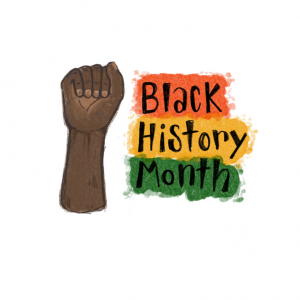Written by Dom Moreno, Edited by Megan Greenspan, Graphics by Lorissa Olsen
A Month of Reflection
As January turns to February, we enter Black History Month; an annual observance to pay tribute to the African Americans who fought for equal rights and citizenship in the United States. Black History Month serves as not only a time of reflection but also a time of education. It is encouraged that during this month, we take the time to engage with information and resources that further our understanding of the ongoing struggle faced by African Americans in the United States. Within this article you will find resources to help guide you through this learning opportunity, from further reading to events being held here on campus throughout the month.
A Very Brief History
Black History Month was first conceived as “Negro History Week” by Dr. Carter G. Woodson. He chose the second week of February as it encompasses both Abraham Lincoln and Frederick Douglass’s birthdays, both men being “great American symbols of freedom”. From here the commemoration was extended to a month by President Gerald Ford in 1976 in homage to Dr. Woodson and the Association for the Study of African American Life and History (ASALH). Black History Month tends to reflect on and bring attention to prominent African American figures in US history. These include of course figures like Dr. Martin Luther King Jr. and W.E.B. Du Bois, civil rights leaders who rallied for change. As well as these people, emphasis is shined on African American individuals who have contributed to our country in other ways, such as Thurgood Marshall, the first African American justice or Mae Jemison, the first female African-American astronaut to travel to space. Classrooms and other environments will often cover a brief overview of the civil rights movement, but it is important for us to acknowledge two things not just this month but all year long. 1) The fight for equality in the United States for African American people is more than just Dr. Martin Luther King Jr. and Rosa Parks. There are hundreds of other figures that are often overlooked for their contributions whose stories deserve to be heard. On a similar note, 2) The work is not done.
Looking to the Future
Equal rights for African Americans is a fight that continues to this day. As citizens of the United States, we need to be cognizant of this fact and do our part everyday, not just once a year in February. Listed below are links to further reading about Black History Month and the struggle of African Americans in general. Education is a tool and committing to learning more during this Black History Month is powerful. Also below is a link to the True Blue Connects page featuring all the events being hosted by different organizations on campus this month. Events such as soul food cookouts and trivia nights, take a look and see which events fit into your schedule!
Campus Resources:
- NAU Black History Month Events | Office of Inclusion
- Black, African, and African American Resources and Initiatives | Office of Inclusion (nau.edu)
- Black Student Union – NAU TRUE BLUE Connects (campuslabs.com)